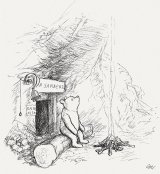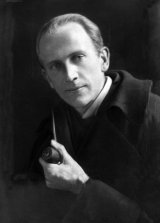Winnie-the-Pooh Page #11
"Winnie-the-Pooh" is a delightful children's book written by A. A. Milne. Set in the Hundred Acre Wood, the story follows the adventures of a lovable bear named Winnie-the-Pooh and his friends, including Christopher Robin, Piglet, Eeyore, Tigger, Rabbit, and Owl. Each chapter brings a new escapade, often involving honey, Pooh's favorite treat. From searching for the North Pole to getting stuck in Rabbit's front door, the characters embark on whimsical journeys full of humor, friendship, and simple joys. The book's charm lies in its gentle lessons about kindness, imagination, and the importance of treasuring the little things in life.
"Your family." "What about them?" Pooh rubbed his nose and said that he thought Rabbit had been talking about his family. "Did I?" said Rabbit carelessly. "Yes, you said----" "Never mind, Pooh," said Piglet impatiently. "The question is, What are we to do about Kanga?" "Oh, I see," said Pooh. "The best way," said Rabbit, "would be this. The best way would be to steal Baby Roo and hide him, and then when Kanga says, 'Where's Baby Roo?' we say, 'Aha!'" "Aha!" said Pooh, practising. "Aha! Aha! ... Of course," he went on, "we could say 'Aha!' even if we hadn't stolen Baby Roo." "Pooh," said Rabbit kindly, "you haven't any brain." "I know," said Pooh humbly. "We say 'Aha!' so that Kanga knows that we know where Baby Roo is. 'Aha!' means 'We'll tell you where Baby Roo is, if you promise to go away from the Forest and never come back.' Now don't talk while I think." Pooh went into a corner and tried saying 'Aha!' in that sort of voice. Sometimes it seemed to him that it did mean what Rabbit said, and sometimes it seemed to him that it didn't. "I suppose it's just practice," he thought. "I wonder if Kanga will have to practise too so as to understand it." "There's just one thing," said Piglet, fidgeting a bit. "I was talking to Christopher Robin, and he said that a Kanga was Generally Regarded as One of the Fiercer Animals. I am not frightened of Fierce Animals in the ordinary way, but it is well known that, if One of the Fiercer Animals is Deprived of Its Young, it becomes as fierce as Two of the Fiercer Animals. In which case 'Aha!' is perhaps a foolish thing to say." "Piglet," said Rabbit, taking out a pencil, and licking the end of it, "you haven't any pluck." "It is hard to be brave," said Piglet, sniffing slightly, "when you're only a Very Small Animal." Rabbit, who had begun to write very busily, looked up and said: "It is because you are a very small animal that you will be Useful in the adventure before us." Piglet was so excited at the idea of being Useful, that he forgot to be frightened any more, and when Rabbit went on to say that Kangas were only Fierce during the winter months, being at other times of an Affectionate Disposition, he could hardly sit still, he was so eager to begin being useful at once. "What about me?" said Pooh sadly. "I suppose I shan't be useful?" "Never mind, Pooh," said Piglet comfortingly. "Another time perhaps." "Without Pooh," said Rabbit solemnly as he sharpened his pencil, "the adventure would be impossible." "Oh!" said Piglet, and tried not to look disappointed. But Pooh went into a corner of the room and said proudly to himself, "Impossible without Me! That sort of Bear." "Now listen all of you," said Rabbit when he had finished writing, and Pooh and Piglet sat listening very eagerly with their mouths open. This was what Rabbit read out: PLAN TO CAPTURE BABY ROO 1. General Remarks. Kanga runs faster than any of Us, even Me. 2. More General Remarks. Kanga never takes her eye off Baby Roo, except when he's safely buttoned up in her pocket. 3. Therefore. If we are to capture Baby Roo, we must get a Long Start, because Kanga runs faster than any of Us, even Me. (See 1.) 4. A Thought. If Roo had jumped out of Kanga's pocket and Piglet had jumped in, Kanga wouldn't know the difference, because Piglet is a Very Small Animal. 5. Like Roo. 6. But Kanga would have to be looking the other way first, so as not to see Piglet jumping in. 7. See 2. 8. Another Thought. But if Pooh was talking to her very excitedly, she might look the other way for a moment. 9. And then I could run away with Roo. 10. Quickly. 11. And Kanga wouldn't discover the difference until Afterwards. Well, Rabbit read this out proudly, and for a little while after he had read it nobody said anything. And then Piglet, who had been opening and shutting his mouth without making any noise, managed to say very huskily: "And--Afterwards?" "How do you mean?" "When Kanga does Discover the Difference?" "Then we all say 'Aha!'" "All three of us?" "Yes." "Oh!" "Why, what's the trouble, Piglet?" "Nothing," said Piglet, "as long as we all three say it. As long as we all three say it," said Piglet, "I don't mind," he said, "but I shouldn't care to say 'Aha!' by myself. It wouldn't sound nearly so well. By the way," he said, "you are quite sure about what you said about the winter months?" "The winter months?" "Yes, only being Fierce in the Winter Months." "Oh, yes, yes, that's all right. Well, Pooh? You see what you have to do?" "No," said Pooh Bear. "Not yet," he said. "What do I do?" "Well, you just have to talk very hard to Kanga so as she doesn't notice anything." "Oh! What about?" "Anything you like." "You mean like telling her a little bit of poetry or something?" "That's it," said Rabbit. "Splendid. Now come along." So they all went out to look for Kanga. Kanga and Roo were spending a quiet afternoon in a sandy part of the Forest. Baby Roo was practising very small jumps in the sand, and falling down mouse-holes and climbing out of them, and Kanga was fidgeting about and saying "Just one more jump, dear, and then we must go home." And at that moment who should come stumping up the hill but Pooh. "Good afternoon, Kanga." "Good afternoon, Pooh." "Look at me jumping," squeaked Roo, and fell into another mouse-hole. "Hallo, Roo, my little fellow!" "We were just going home," said Kanga. "Good afternoon, Rabbit. Good afternoon, Piglet." Rabbit and Piglet, who had now come up from the other side of the hill, said "Good afternoon," and "Hallo, Roo," and Roo asked them to look at him jumping, so they stayed and looked. And Kanga looked too.... "Oh, Kanga," said Pooh, after Rabbit had winked at him twice, "I don't know if you are interested in Poetry at all?" "Hardly at all," said Kanga. "Oh!" said Pooh. "Roo, dear, just one more jump and then we must go home." There was a short silence while Roo fell down another mouse-hole. "Go on," said Rabbit in a loud whisper behind his paw. "Talking of Poetry," said Pooh, "I made up a little piece as I was coming along. It went like this. Er--now let me see----" "Fancy!" said Kanga. "Now Roo, dear----" "You'll like this piece of poetry," said Rabbit. "You'll love it," said Piglet. "You must listen very carefully," said Rabbit. "So as not to miss any of it," said Piglet. "Oh, yes," said Kanga, but she still looked at Baby Roo. "How did it go, Pooh?" said Rabbit. Pooh gave a little cough and began. LINES WRITTEN BY A BEAR OF VERY LITTLE BRAIN On Monday, when the sun is hot I wonder to myself a lot: "Now is it true, or is it not, "That what is which and which is what?" On Tuesday, when it hails and snows, The feeling on me grows and grows That hardly anybody knows If those are these or these are those.
Translation
Translate and read this book in other languages:
Select another language:
- - Select -
- 简体中文 (Chinese - Simplified)
- 繁體中文 (Chinese - Traditional)
- Español (Spanish)
- Esperanto (Esperanto)
- 日本語 (Japanese)
- Português (Portuguese)
- Deutsch (German)
- العربية (Arabic)
- Français (French)
- Русский (Russian)
- ಕನ್ನಡ (Kannada)
- 한국어 (Korean)
- עברית (Hebrew)
- Gaeilge (Irish)
- Українська (Ukrainian)
- اردو (Urdu)
- Magyar (Hungarian)
- मानक हिन्दी (Hindi)
- Indonesia (Indonesian)
- Italiano (Italian)
- தமிழ் (Tamil)
- Türkçe (Turkish)
- తెలుగు (Telugu)
- ภาษาไทย (Thai)
- Tiếng Việt (Vietnamese)
- Čeština (Czech)
- Polski (Polish)
- Bahasa Indonesia (Indonesian)
- Românește (Romanian)
- Nederlands (Dutch)
- Ελληνικά (Greek)
- Latinum (Latin)
- Svenska (Swedish)
- Dansk (Danish)
- Suomi (Finnish)
- فارسی (Persian)
- ייִדיש (Yiddish)
- հայերեն (Armenian)
- Norsk (Norwegian)
- English (English)
Citation
Use the citation below to add this book to your bibliography:
Style:MLAChicagoAPA
"Winnie-the-Pooh Books." Literature.com. STANDS4 LLC, 2025. Web. 22 Jan. 2025. <https://www.literature.com/book/winnie-the-pooh_2005>.




Discuss this Winnie-the-Pooh book with the community:
Report Comment
We're doing our best to make sure our content is useful, accurate and safe.
If by any chance you spot an inappropriate comment while navigating through our website please use this form to let us know, and we'll take care of it shortly.
Attachment
You need to be logged in to favorite.
Log In